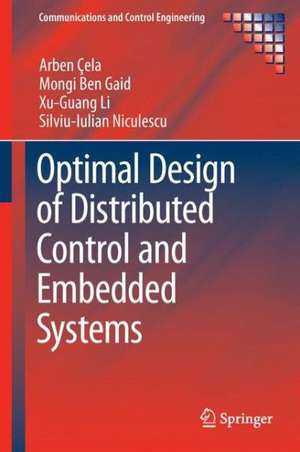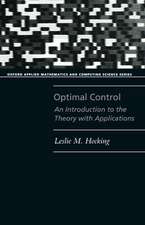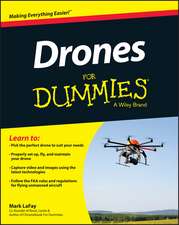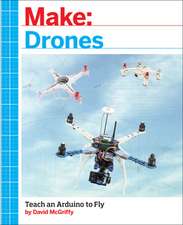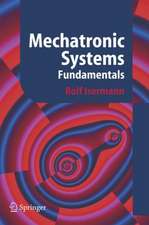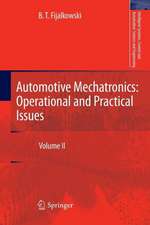Optimal Design of Distributed Control and Embedded Systems: Communications and Control Engineering
Autor Arben Çela, Mongi Ben Gaid, Xu-Guang Li, Silviu-Iulian Niculescuen Limba Engleză Hardback – 16 dec 2013
Particular emphasis is put on optimal control signal scheduling based on the system state. In order to render this complex optimization problem feasible in real time, a time decomposition is based on periodicity induced by the static scheduling is operated. The authors present a co-design approach which subsumes the synthesis of the optimal control laws and the generation of an optimal schedule of control signals on real-time networks as well as the execution of control tasks on a single processor. The authors also operate a control structure modification or a control switching based on a thorough analysis of the influence of the induced time-delay system influence on stability and system performance in order to optimize DCES performance in case of calculation and communication resource limitations. Although the richness and variety of classes of DCES preclude a completely comprehensive treatment or a single “best” method of approaching them all, this co-design approach has the best chance of rendering this problem feasible and finding the optimal or some sub-optimal solution. The text is rounded out with references to such applications as car suspension and unmanned vehicles.
Optimal Design of Distributed Control and Embedded Systems will be of most interest to academic researchers working on the mathematical theory of DCES but the wide range of environments in which they are used also promotes the relevance of the text forcontrol practitioners working in the avionics, automotive, energy-production, space exploration and many other industries.
| Toate formatele și edițiile | Preț | Express |
|---|---|---|
| Paperback (1) | 945.30 lei 6-8 săpt. | |
| Springer International Publishing – 17 sep 2016 | 945.30 lei 6-8 săpt. | |
| Hardback (1) | 956.03 lei 6-8 săpt. | |
| Springer International Publishing – 16 dec 2013 | 956.03 lei 6-8 săpt. |
Din seria Communications and Control Engineering
- 15%
 Preț: 659.70 lei
Preț: 659.70 lei - 20%
 Preț: 879.74 lei
Preț: 879.74 lei - 18%
 Preț: 953.65 lei
Preț: 953.65 lei - 18%
 Preț: 1117.03 lei
Preț: 1117.03 lei - 9%
 Preț: 1385.77 lei
Preț: 1385.77 lei - 18%
 Preț: 1128.08 lei
Preț: 1128.08 lei - 18%
 Preț: 953.65 lei
Preț: 953.65 lei - 15%
 Preț: 656.89 lei
Preț: 656.89 lei - 18%
 Preț: 896.52 lei
Preț: 896.52 lei - 18%
 Preț: 1113.26 lei
Preț: 1113.26 lei - 18%
 Preț: 1388.22 lei
Preț: 1388.22 lei - 15%
 Preț: 647.27 lei
Preț: 647.27 lei - 18%
 Preț: 954.45 lei
Preț: 954.45 lei - 18%
 Preț: 1231.47 lei
Preț: 1231.47 lei - 18%
 Preț: 948.92 lei
Preț: 948.92 lei - 18%
 Preț: 1232.57 lei
Preț: 1232.57 lei - 18%
 Preț: 1127.28 lei
Preț: 1127.28 lei - 15%
 Preț: 643.34 lei
Preț: 643.34 lei - 18%
 Preț: 1401.30 lei
Preț: 1401.30 lei - 15%
 Preț: 651.51 lei
Preț: 651.51 lei - 20%
 Preț: 1454.07 lei
Preț: 1454.07 lei - 18%
 Preț: 948.79 lei
Preț: 948.79 lei - 18%
 Preț: 1233.06 lei
Preț: 1233.06 lei - 18%
 Preț: 947.85 lei
Preț: 947.85 lei - 18%
 Preț: 950.96 lei
Preț: 950.96 lei - 18%
 Preț: 956.99 lei
Preț: 956.99 lei - 15%
 Preț: 644.18 lei
Preț: 644.18 lei - 18%
 Preț: 946.87 lei
Preț: 946.87 lei - 18%
 Preț: 951.14 lei
Preț: 951.14 lei - 18%
 Preț: 961.55 lei
Preț: 961.55 lei - 15%
 Preț: 644.18 lei
Preț: 644.18 lei - 20%
 Preț: 990.80 lei
Preț: 990.80 lei - 18%
 Preț: 1006.72 lei
Preț: 1006.72 lei - 18%
 Preț: 942.44 lei
Preț: 942.44 lei - 18%
 Preț: 1233.06 lei
Preț: 1233.06 lei - 15%
 Preț: 641.85 lei
Preț: 641.85 lei - 18%
 Preț: 957.75 lei
Preț: 957.75 lei - 15%
 Preț: 649.87 lei
Preț: 649.87 lei - 18%
 Preț: 958.07 lei
Preț: 958.07 lei - 18%
 Preț: 1117.99 lei
Preț: 1117.99 lei - 18%
 Preț: 1395.94 lei
Preț: 1395.94 lei - 18%
 Preț: 781.62 lei
Preț: 781.62 lei - 18%
 Preț: 953.20 lei
Preț: 953.20 lei - 18%
 Preț: 1109.78 lei
Preț: 1109.78 lei
Preț: 956.03 lei
Preț vechi: 1165.88 lei
-18% Nou
Puncte Express: 1434
Preț estimativ în valută:
182.96€ • 190.31$ • 151.04£
182.96€ • 190.31$ • 151.04£
Carte tipărită la comandă
Livrare economică 14-28 aprilie
Preluare comenzi: 021 569.72.76
Specificații
ISBN-13: 9783319027289
ISBN-10: 331902728X
Pagini: 312
Ilustrații: XXIV, 288 p. 94 illus., 60 illus. in color.
Dimensiuni: 155 x 235 x 22 mm
Greutate: 0.75 kg
Ediția:2014
Editura: Springer International Publishing
Colecția Springer
Seria Communications and Control Engineering
Locul publicării:Cham, Switzerland
ISBN-10: 331902728X
Pagini: 312
Ilustrații: XXIV, 288 p. 94 illus., 60 illus. in color.
Dimensiuni: 155 x 235 x 22 mm
Greutate: 0.75 kg
Ediția:2014
Editura: Springer International Publishing
Colecția Springer
Seria Communications and Control Engineering
Locul publicării:Cham, Switzerland
Public țintă
ResearchCuprins
From the Contents: Part I Abstract Model of Distributed Control and Embedded Systems:- Introduction to Distributed Control and Embedded Systems.- Part II Optimal Co-design of Distributed Control and Embedded Systems.- Optimal Integrated Control and Scheduling of Resource-constrained Systems.- Part III Insights in DECS and Delayed Systems.- Stability Analysis of Distributed Control and Embedded Systems Subject to State and Control Delays.
Notă biografică
Silviu-Iulian Niculescu was born in Petrosani, Romania in 1968. He received the B.S. degree from the Polytechnical Institute of Bucharest, Romania, the M.Sc., and Ph.D. degrees, both in Automatic Control, from the Institut National Polytechnique de Grenoble, France, and the “Habilitation à Diriger des Recherches” (HDR) in Automatic Control from Université de Technologie de Compiègne, in 1992, 1993, 1996, and 2003, respectively. From 1992 to 1997, he was with the Department of Automatic Control and Computers, University “Politehnica” Bucharest, Romania. From 1997 to 2006, he was with HEUDIASYC (“Heuristics and diagnosis of complex systems”) laboratory, Compiègne, France as a Researcher at CNRS (French National Center for Scientific Research). He also held a PostDoctoral position in the Department of Applied Mathematics, ENSTA, Paris, France, from 1996 to 1997. In September 2006, he joined L2S (Laboratory of Signals and Systems), Gif-sur-Yvette, where he is currently Research Director (“Senior Researcher”) at CNRS and head of the laboratory. He is the single author of two books: delay systems. Qualitative aspects on the stability and stabilization (Diderot: Paris, 1997; in French), and Delay effects on stability. A robust control approach (Springer: Heidelberg, LNCIS, vol. 269, 2001; in English), co-author of one book (with Wim Michiels) entitled Stability and stabilization of time-delay systems. An eigenvalue-based approach (SIAM: Philadelphia, USA, 2007) and co-editor of five volumes (SIAM, 1999; Pergamon Press, 2001; Springer 2004; Springer 2007; Springer 2009). He is author or co-author of more than 300 book chapters or scientific papers. He has been the IPC Chairman of the 3rd IFAC Workshop on Time-Delay Systems (Santa Fe, NM, USA, December 2001) and of the 8th IFAC Workshop on Time-Delay Systems (Sinaia, Romania, September 2009), and the main organizer or co-organizer of the 1st CNRS-NSF Workshop on Time-Delay Systems (Paris: LaDéfense, January 2003), and of the 23rd European Summer School in Automatic Control (Grenoble, September 2000) devoted to time-delay systems. He was the guest co-editor of five special issues in the area of delay systems (Journal of Mathematical Modelling of Natural Phenomena (MMNP) in 2009 Asian Journal of Control in 2005, IMA Journal of Mathematical Control and Information in 2002 and 2010, and Kybernetika in 2001). Dr. Niculescu has been scientific responsible of 14 international cooperation programs and projects (with Belgium, Mexico, Romania and Eastern European countries, South Korea, Turkey and United States). He is member of IFAC Technical Committee on Linear Systems (since 2002) and of the IPC of 33 International Conferences, and he was an Associate Editor of the IEEE Transactions on Automatic Control (2003-2005). Since 2011, He is an Associate Editor of European Journal of Control and IMA Journal of Mathematical Control and Information. He is the responsible of the IFAC Research Group on “Time-delay systems” since its creation in October 2007. Dr. Niculescu was awarded the CNRS Bronze Medal for scientific research, the Best Paper Presentation Award at American Control Conference, Chicago, IL and the Ph.D. Thesis Award from INPG, Grenoble (France) in 2001, 2000, and 1996, respectively. His research interests include delay systems, robust control, operator theory, and numerical methods in optimization, and their applications to the design of engineering systems.
Textul de pe ultima copertă
Optimal Design of Distributed Control and Embedded Systems focuses on the design of special control and scheduling algorithms based on system structural properties as well as on analysis of the influence of induced time-delay on systems performances. It treats the optimal design of distributed and embedded control systems (DCESs) with respect to communication and calculation-resource constraints, quantization aspects, and potential time-delays induced by the associated communication and calculation model.
Particular emphasis is put on optimal control signal scheduling based on the system state. In order to render this complex optimization problem feasible in real time, a time decomposition is based on periodicity induced by the static scheduling is operated. The authors present a co-design approach which subsumes the synthesis of the optimal control laws and the generation of an optimal schedule of control signals on real-time networks as well as the execution of control tasks on a single processor. The authors also operate a control structure modification or a control switching based on a thorough analysis of the influence of the induced time-delay system influence on stability and system performance in order to optimize DCES performance in case of calculation and communication resource limitations. Although the richness and variety of classes of DCES preclude a completely comprehensive treatment or a single “best” method of approaching them all, this co-design approach has the best chance of rendering this problem feasible and finding the optimal or some sub-optimal solution. The text is rounded out with references to such applications as car suspension and unmanned vehicles.
Optimal Design of Distributed Control and Embedded Systems will be of most interest to academicresearchers working on the mathematical theory of DCES but the wide range of environments in which they are used also promotes the relevance of the text for control practitioners working in the avionics, automotive, energy-production, space exploration and many other industries.
The Communications and Control Engineering series reports major technological advances which have potential for great impact in the fields of communication and control. It reflects research in industrial and academic institutions around the world so that the readership can exploit new possibilities as they become available.
Particular emphasis is put on optimal control signal scheduling based on the system state. In order to render this complex optimization problem feasible in real time, a time decomposition is based on periodicity induced by the static scheduling is operated. The authors present a co-design approach which subsumes the synthesis of the optimal control laws and the generation of an optimal schedule of control signals on real-time networks as well as the execution of control tasks on a single processor. The authors also operate a control structure modification or a control switching based on a thorough analysis of the influence of the induced time-delay system influence on stability and system performance in order to optimize DCES performance in case of calculation and communication resource limitations. Although the richness and variety of classes of DCES preclude a completely comprehensive treatment or a single “best” method of approaching them all, this co-design approach has the best chance of rendering this problem feasible and finding the optimal or some sub-optimal solution. The text is rounded out with references to such applications as car suspension and unmanned vehicles.
Optimal Design of Distributed Control and Embedded Systems will be of most interest to academicresearchers working on the mathematical theory of DCES but the wide range of environments in which they are used also promotes the relevance of the text for control practitioners working in the avionics, automotive, energy-production, space exploration and many other industries.
The Communications and Control Engineering series reports major technological advances which have potential for great impact in the fields of communication and control. It reflects research in industrial and academic institutions around the world so that the readership can exploit new possibilities as they become available.
Caracteristici
Provides the reader with a unified approach to the analysis and design of distributed and embedded control systems Explains the well-known optimal pointer placement algorithm as a solution to complexity reduction problem Example applications such as car suspension and a UAV assist the reader’s understanding of the techniques propounded Includes supplementary material: sn.pub/extras
